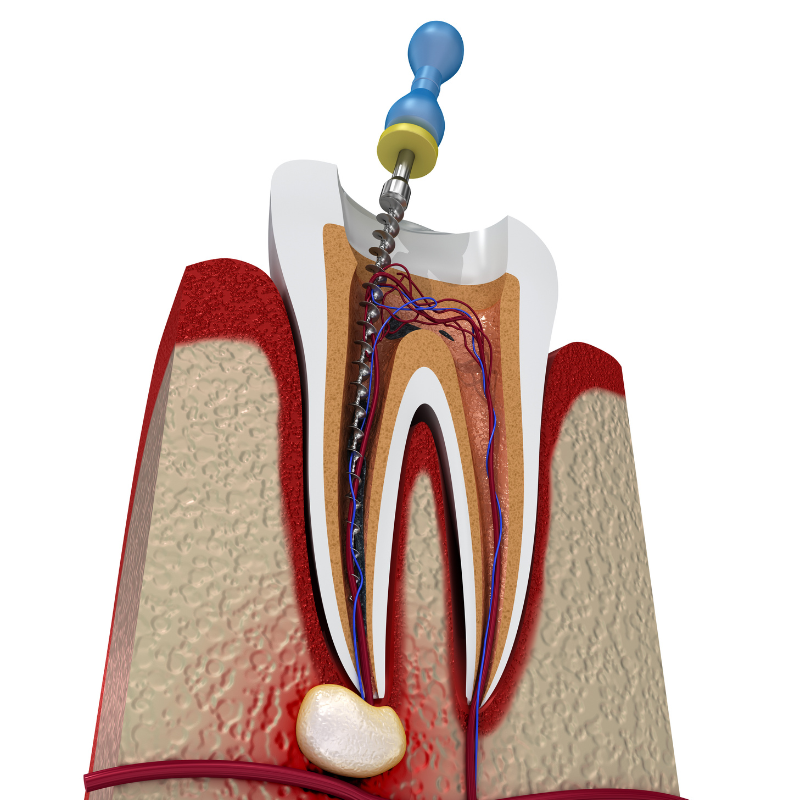
Root canal treatment is a common dental procedure that is performed to save a severely damaged or infected tooth. It involves removing the damaged or infected tissue from the tooth's pulp, cleaning and disinfecting the pulp chamber and root canals, and filling them with a material to prevent further infection. Here's what you need to know about root canals:
Why You Might Need a Root Canal
A root canal is usually necessary when the pulp, which is the soft tissue inside the tooth that contains nerves and blood vessels, becomes infected or damaged. This can happen due to deep decay, repeated dental procedures on the same tooth, a cracked or chipped tooth, or trauma to the tooth. Symptoms of an infected or damaged pulp can include severe pain, swelling, sensitivity to hot or cold, and a bad taste in the mouth.
The Root Canal Procedure
The root canal procedure is usually performed over two or more appointments. During the first appointment, the dentist will numb the area around the affected tooth with local anesthesia. Then, they will create an opening in the top of the tooth to access the pulp chamber and root canals. Using special instruments, they will remove the damaged or infected pulp and clean and disinfect the pulp chamber and root canals. The dentist may also place medication inside the tooth to help eliminate any remaining bacteria.
At the next appointment, the dentist will fill the pulp chamber and root canals with a material called gutta-percha, which is a rubber-like material that seals the canals to prevent bacteria from entering. The dentist may also place a temporary filling on top of the tooth to protect it until a permanent restoration, such as a crown, can be placed.
After the procedure, the tooth may be sensitive for a few days, and the dentist may recommend over-the-counter pain relievers or prescribe medication. It's important to follow the dentist's aftercare instructions and maintain good oral hygiene to prevent further infection.
Benefits of Root Canal Treatment
Root canal treatment can save a severely damaged or infected tooth, prevent the spread of infection to other teeth and the jawbone, and restore the tooth's function and appearance. It can also alleviate pain and improve overall oral health.
Alternatives to Root Canal Treatment
If a tooth is severely damaged or infected and cannot be saved with root canal treatment, the only alternative is to have the tooth extracted. However, removing a tooth can lead to other problems, such as shifting of the remaining teeth, difficulty chewing, and bone loss in the jaw.
If you are experiencing symptoms of an infected or damaged tooth, it's important to see a dentist as soon as possible. They can determine if a root canal is necessary and provide the appropriate treatment to restore your oral health.
Our Doctors
SMILE IN MINUTES Dental Care Doctors

Dr. Priyanka
Sr. Dental Surgeon

Dr. Mowmita Barik
Dental Surgeon (BDS)

Dr. Sapna
Dental Surgeon (BDS)

Dr. Md. Shoaib
Dental Surgeon (BDS)

Dr. Rubiya
Dental Surgeon (BDS)

Dr. Kuldeep
Dental Surgeon (BDS)

Dr. Ribhu
Dental Surgeon (BDS)

Dr. Sonam Tonger
Dental Surgeon (BDS)

Dr. Chanderalata
Dental Surgeon (BDS)

Dr. Neha
Dental Surgeon (BDS)

Dr. Priyanka Arora Sethi
Dental Surgeon (BDS)



